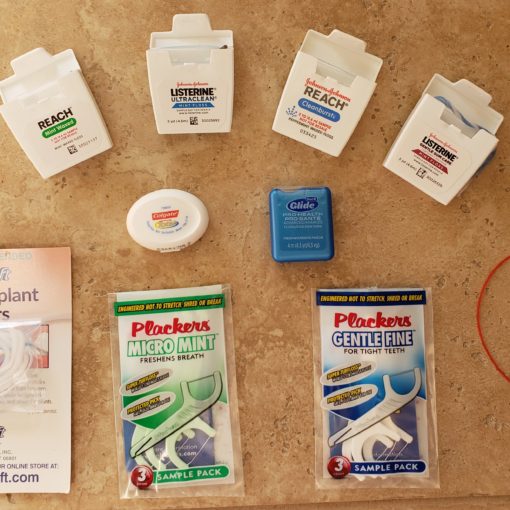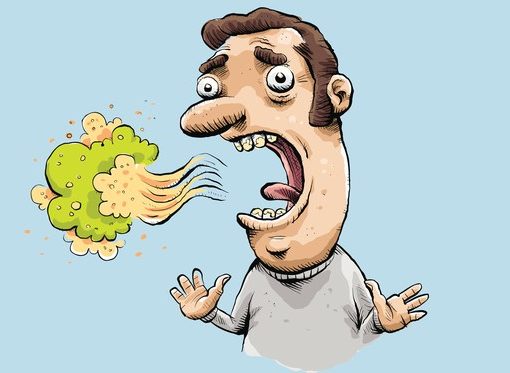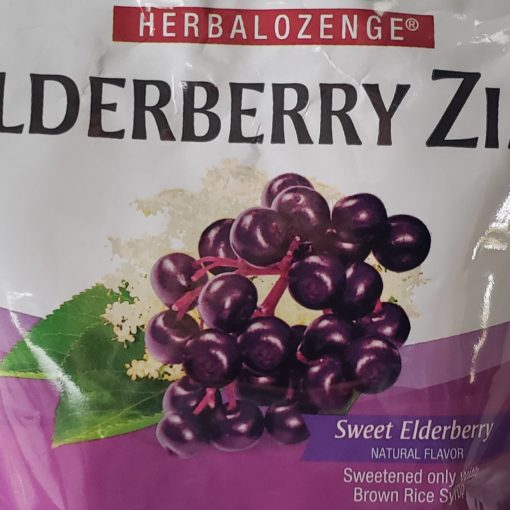DRY MOUTH or XEROSTOMIA
Dry Mouth
Dry mouth, also called xerostomia, is not a fun condition. It’s when the mouth is not producing an adequate amount of saliva to keep the oral cavity moistened. The tongue can be raw and red, and having a burning or tingling sensation. Dry mouth can increase tooth decay, gum disease, thrush and mouth infections. It can also make denture wearing very uncomfortable.
The Purpose of Saliva
Produced from the salivary glands saliva is 98% water, with the remaining 2 % including electrolytes, mucus, antibacterial compounds and various enzymes. Saliva is composed of sodium, potassium, calcium, magnesium, bicarbonate, phosphates, immunoglobulins, proteins, mucins, urea and ammonia. Helps prevent infection by controlling bacteria and fungi and removing harmful bacteria that can cause cavities and infections. Also, provides a physical barrier against local irritants and moistens, lubricates and cleans the mouth, tissue and tongue and creates smoother speech. Saliva protects the teeth to help lower the risk of cavities by preventing demineralization and promoting remineralization. It holds enzymes, minerals, and nutrients for mucosal repair and stabilizes a pH and electrolyte balance. Saliva is considered the first step of digestion in aiding in chewing, swallowing and digesting food. A healthy mouth produces .75-1.5 liters a day.
Causes of Dry Mouth
Aging. As we get older we produce less saliva.
Chemo and radiation. Dries up temporary or permanently damages the salivary glands.
CPAP. Dry mouth could come from the CPAP itself, with the design of it to gently blow air down the throat for better breathing, causing the side effect of dry tissue in the mouth. Or from simply having the mouth open all night.
Diet. Alcohol, coffee, caffeine, carbonated beverages, salty foods.
Dehydration. Lack of moisture causes dryness.
Eating Disorder. Starving and purging can lower the body’s production of saliva.
Medications. Over 400 medications can cause dry mouth such as: Anti-depressants, anti-anxiety, pain, anti-histamines, ADHD, high blood pressure, decongestants, diuretics, psychotic, Parkinson’s, nausea, diarrhea, bronchodilators, urinary incontinence, pain killers, sedatives and muscle relaxants
Menopause. A change in hormones.
Mouth breathing. Excess air dries the mouth.
Nerve Damage. Head and neck injury. Some nerves carry messages from the brain to the salivary glands.
Medical Conditions. Alzheimer’s, Diabetes, Anemia, Cystic Fibrosis, Sjogren’s disease, HIV/AIDS, Rheumatoid Arthritis, Hypertension, Parkinson’s, Stroke and Mumps, Asthma
Recreational Drugs.
Salivary gland damage or trauma. Physical trauma or frequent vomiting can cause problems with saliva production.
Smoking. The smoke from the cigarette, pipe or cigar, dries the mouth.
Sports and exercising. Intense exercise can cause dry mouth by breathing through the mouth and dehydration.
Stress.
VARIETY OF DRY MOUTH PRODUCTSGel. Soothe and moistens the mouth to alleviate the symptoms.
Gum. Stimulates the salivary glands.
Lozenges. Works by sucking on the lozenges to stimulate saliva and soothes, moistens and freshens the breath.
Mouth wash. Moistens and soothes oral tissue.
Spray. Use throughout the day as needed by spraying directly onto the tongue and then spreading it around the mouth.
Toothpaste. Contains fluoride to help lower the risk of cavities.
DRY MOUTH PRODUCTS
Dry mouth is like dry skin, any product used is going to relieve the discomfort temporary. All these products are used for temporary relief, they are not a cure for dry mouth. Depending on the reason for dry mouth depends on how temporary this issue may be. For instance, if it’s from medications or a health condition, as long as the medication or condition is present, a dry mouth will continue. So “dealing” with a dry mouth becomes a way of life, there’s only relief not a cure, unless the medication is stopped, or the condition is improved.
Biotene. Rinse, toothpaste, spray, gel.
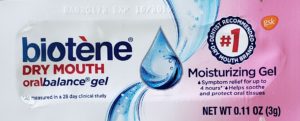

Act. Rinse, toothpaste, spray, lozenges, gum.
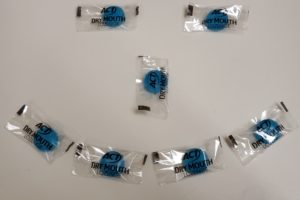
Colgate. Rinse, toothpaste.
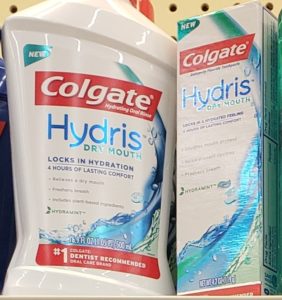
Enamelon. Toothpaste — provides Ultramulsion, a patented saliva-soluble coating that moisturizes and soothes oral tissues. Contains Spilanthes — a natural herb which encourages and heightens flavor to increase salivary flow and maintain equilibrium.

Prevident for Dry Mouth (by Colgate). A prescription toothpaste. Can be purchased in the dental office or depending on the office a written prescription will be done
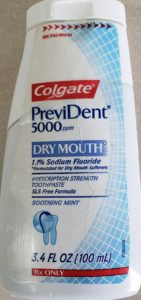
XyliMelts. The main ingredient is xylitol, which aids in reducing the risk of decay. XyliMelts work by slowly releasing effective concentrations of xylitol into the mouth by coating and lubricating the mouth through increasing saliva. This product can be used during the day or at night.
Read the instructions, since applying the disc is specific. Placing one or two discs on the outside of an upper or lower molar with the white side of the disc touching the cheek and the tan side on the tooth. Use the tongue to push the disc to a comfortable spot and leave alone for 10 seconds, as movement will disrupt the adhesion.
There are NO animal products, dye, colorings, preservatives, artificial flavors, fermentable sugars, gluten, egg, nuts, milk, and shellfish.
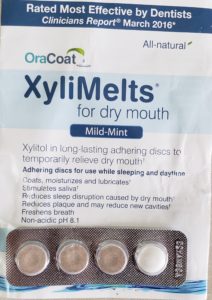
Prescription Medications
Medications to help produce saliva are Pilocarpine (Salagen) and Cevimeline (Evoxac). Keep in mind these meds have their own set of side effects also and interact with many other medications.
Salagen affects the nervous system and increases saliva secretion in the mouth. This medication is used mostly for Sjogren’s syndrome and radiation to head and neck.
Evoxac works by stimulating certain nerves to increase the amount of saliva produced. It is commonly used for certain immune diseases, including Sjogren’s syndrome.



